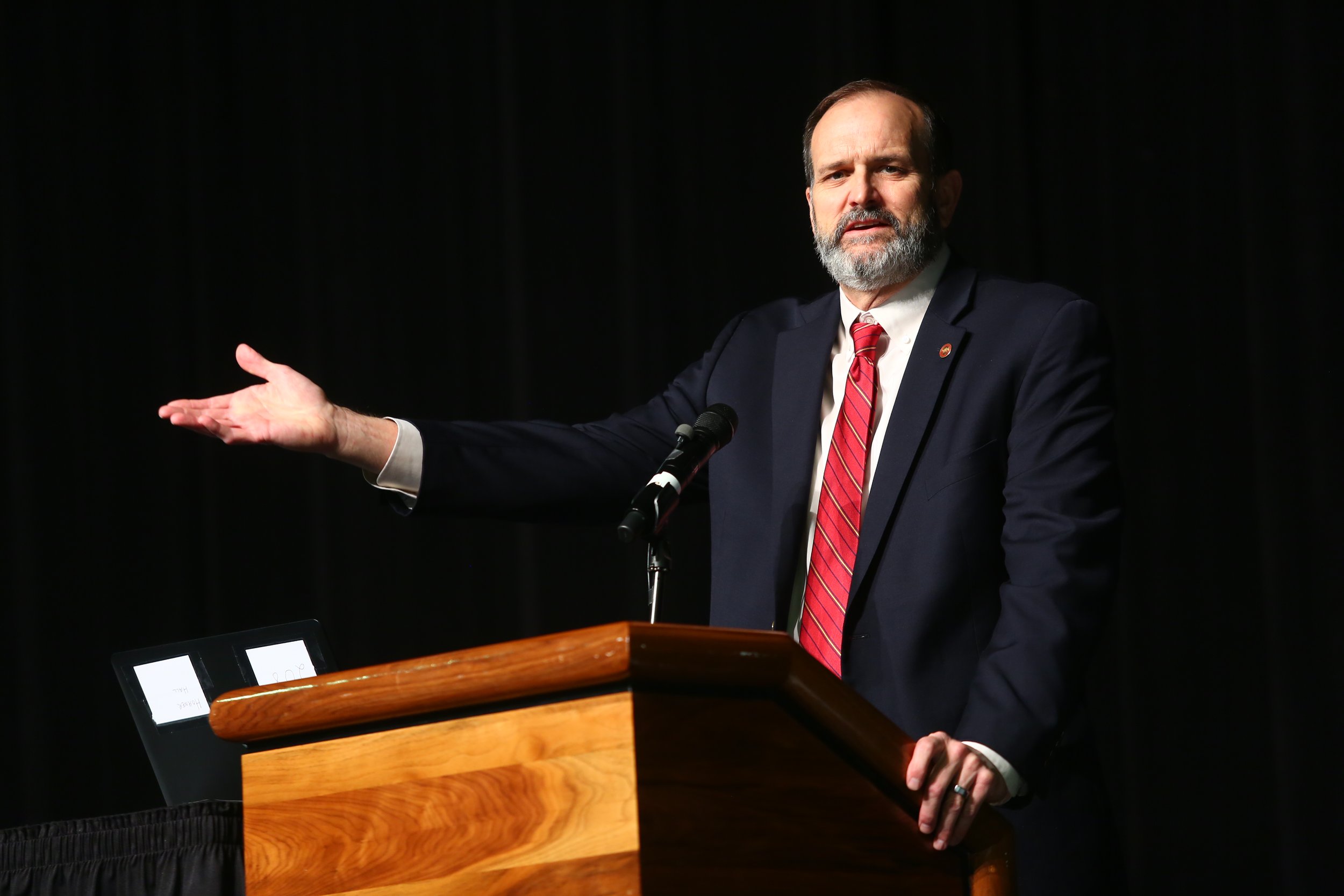The listening session, one of two held this week by U.S. Sen. John Boozman, ranking member of the Senate Agriculture Committee, drew a standing-room-only crowd to UAM’s agriculture building. On Monday, Boozman held a hearing at the University of Arkansas at Fort Smith and said later there would be sessions in all four of Arkansas’ Congressional districts.
The listening sessions are important because “the solutions to the problems seem to come from our producers and the people directly related” to agriculture, Boozman said. “We’re working really hard to hear from them so we can come up with a good process.”
Tuesday’s session featured a panel that represented row crop farmers, the timber industry, insurance, banking and community issues. Sharing the front table with Boozman and the panelists was U.S. Rep. Bruce Westerman.
Jim Whitaker, a rice grower from McGehee, said “Americans are realizing that food security is national security” and supporting the rice industry “is a worthy investment.”
“The Farm Bill, specifically Price Loss Coverage, is really our true safety net,” Whitaker said, adding that PLC levels the playing field among highly subsidized global competitors. “U.S. farm families cannot compete in such a distorted market.”
PLC provides payments if a commodity price falls below a reference price set in the Farm Bill. ARC, or Agriculture Risk Coverage, provides payments if crop revenue falls below a guaranteed level. While both can help farmers when the markets don’t run in their favor, they are not crop insurance programs.
“With ARC and PLC, you don’t pay a premium,” said Hunter Biram, extension economist for the University of Arkansas System Division of Agriculture. “Insurance is a risk transfer. For example, when you and I buy car insurance, we’re paying a company to take on the risk, so we don’t incur the full loss of not having a car.
“With crop insurance, a farmer is going to pay a premium to transfer the risk,” Biram said.
Wes Kirkpatrick, a soy, cotton and corn farmer from Desha County, also urged continued support of PLC and ARC.
“Those programs should also be continued, but I also think the reference prices used in those may need to be re-evaluated because of the increases in input costs — drastic increases,” Kirkpatrick said.
Biram said only Congress can change the reference prices.
Conservation programs
Whitaker and Kirkpatrick also sought more support for conservation programs for farmers. The U.S. Department of Agriculture, through its Natural Resources Conservation Service, works with farmers to improve conservation efforts on their working lands through programs such as EQIP, or the Environmental Quality Incentives Program, and CSP, the Conservation Stewardship Program.
Because of the expense of implementing conservation efforts on farms, “we believe Congress should prioritize working lands like CSP, EQIP or set-aside programs,” Whitaker said.
Kirkpatrick said not only would he like to see continued funding, but also “we’d really like to see increases.”
Crop insurance
“The crop insurance component of the Farm Bill is where I think most of the work needs to be focused on … so that we have a crop insurance program that works for everybody,” Kirkpatrick said.
The multi-peril insurance plan he purchased provided no help following two floods in 2021. His farm did get help through a replant policy, which was an additional expense. To make things worse, disaster relief payments from those floods were tied to crop insurance settlements, which Kirkpatrick did not get.
“We probably could’ve bought an insurance policy that would have covered us during the flood event, but it likely would’ve been more expensive than what we could afford,” he said.
Kirkpatrick cited an example of the differences between crop insurance prices in the South vs. the Midwest.
“For the same policy, the premium per acre is 5.5 times higher in Desha County than it is in McLean County, Illinois. I think that is where we need to have conversation about some crop insurance,” he said.
“What we do know is that premium rates are calculated based on county-level loss history," Biram said. “Based on this fact, the reason the premium rates are higher in Arkansas and the Mississippi Delta region is because there are more losses in this area relative to the Midwest. The real question is what drives the losses, and can we do anything about it?”
Timber needs new markets
Grant Pace, who represented the timber industry said, “The most important thing is that we need new markets. With 95 percent of our current consumers outside the U.S., I think the new Farm Bill presents a great opportunity for us to fund more research on how our industry can expand current markets.
“We are growing about 23 million more tons a year than we’re harvesting. Without new markets, we’re kind of dead in the water,” Pace said.
Several people said farmers struggled to get labor to their farms and noted that the H2A visa process is becoming more difficult.
“Unfortunately, it is very difficult for our farmers and our loggers to find help,” said Mark Tiner of Union Bank, which works closely with agricultural interests.
“We need immigration reform to make it easier for people who are coming to the country to work,” he said.
Not a one-size-fits all Farm Bill
“Farm Bills aren’t about Republicans and Democrats. It’s all about different regions of the country and different commodities,” Boozman said. “I think the important thing is to make sure that it's not a one-size-fits-all. It just doesn't work that way.
“The good news is that I think Congress really wants to get a Farm Bill. I think they realize how important it is to rural America,” he said.
“The idea that we are dealing with a very, very different situation than we have in the past Farm Bills, with the nature of inflation, these high input rates, which never seem to go down, but commodity prices probably will and so, as a result, it’s just trying to put that all together,” Boozman said.
To learn about extension programs in Arkansas, contact your local Cooperative Extension Service agent or visit www.uaex.uada.edu. Follow us on Twitter and Instagram at @AR_Extension. To learn more about Division of Agriculture research, visit the Arkansas Agricultural Experiment Station website: https://aaes.uada.edu/. Follow on Twitter at @ArkAgResearch. To learn more about the Division of Agriculture, visit https://uada.edu/. Follow us on Twitter at @AgInArk.























